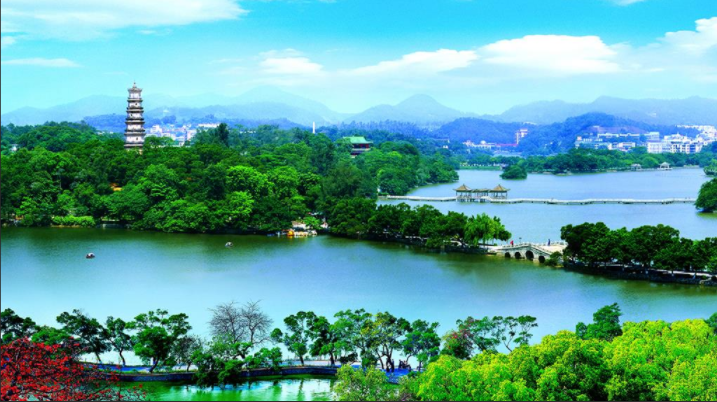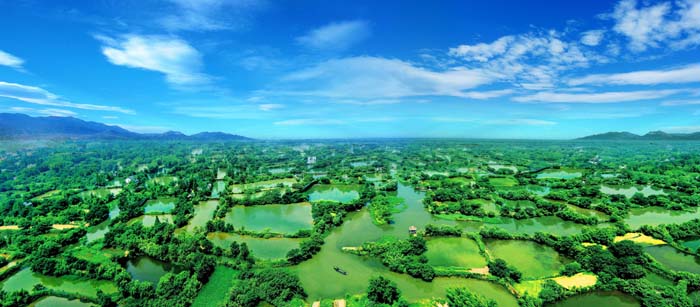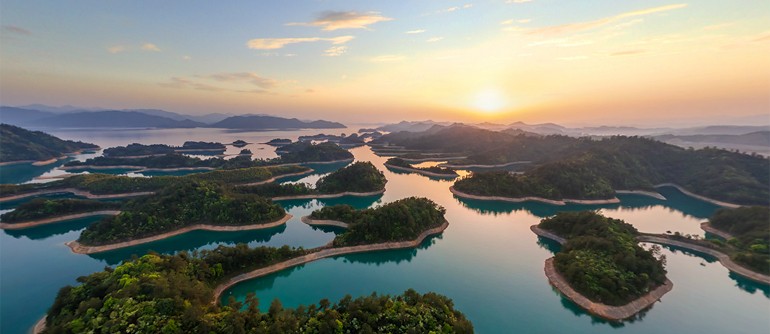


Hangzhou, and
capital of Zhejiang sheng (province), China. The city is
located in the northern part of the province on the
north bank of the Qiantang River estuary at the head of
Hangzhou Bay. It has water communications with the
interior of Zhejiang to the south, is the southern
terminus of the Grand Canal, and is linked to the
network of canals and waterways that cover the Yangtze
River (Chang Jiang) delta area to the north. The city
stands at the eastern foot of a scenic range of hills,
the Tianmu (“Eye of Heaven”) Mountains, and on the shore
of the famous Xi (West) Lake, celebrated in poetry and
paintings for its beauty and a favorite imperial
retreat.
|
Lingyin Temple, established in 326A.D. is the most famous temple in Hangzhou with a long history of about 1,700 years. Situated at the west end of the West Lake, the temple is confronted with Feilai Mountain and backed by Beigao Mountain. In the section flanked by the two mountains ar massive trees, the old temple, and dramtic clouds in many shapes and sizes. |
 West
Lake is
a freshwater lake in Hangzhou. It is divided into
five sections by three causeways. There are numerous
temples, pagodas, gardens, and artificial islands
within the lake. West Lake has influenced poets and
painters throughout China's history for its natural
beauty and historic relics, and it has also been
among the most important sources of inspiration for
Chinese garden designers. It was made a UNESCO World
Heritage Site in 2011, described as having
"influenced garden design in the rest of China as
well as Japan and Korea over the centuries" and
reflecting "an idealized fusion between humans and
nature". West
Lake is
a freshwater lake in Hangzhou. It is divided into
five sections by three causeways. There are numerous
temples, pagodas, gardens, and artificial islands
within the lake. West Lake has influenced poets and
painters throughout China's history for its natural
beauty and historic relics, and it has also been
among the most important sources of inspiration for
Chinese garden designers. It was made a UNESCO World
Heritage Site in 2011, described as having
"influenced garden design in the rest of China as
well as Japan and Korea over the centuries" and
reflecting "an idealized fusion between humans and
nature".
|
 Xixi
National Wetland Park is
the only national wetland park in China, located at
the west part of Hangzhou, a total of 1,150 hectares
(2,800 acres). The park is densely crisscrossed with
six main watercourses, among which scatter various
ponds, lakes and swamps.XiXi Wetland has a history
of more than 1,800 years and an abundant cultural
heritage. It's the original site of Chinese South
Opera; it has a traditional Dragon Boat Contest; it
contains the vivid life of a water village,
featuring silkworm feeding and silk production. Xixi
National Wetland Park is
the only national wetland park in China, located at
the west part of Hangzhou, a total of 1,150 hectares
(2,800 acres). The park is densely crisscrossed with
six main watercourses, among which scatter various
ponds, lakes and swamps.XiXi Wetland has a history
of more than 1,800 years and an abundant cultural
heritage. It's the original site of Chinese South
Opera; it has a traditional Dragon Boat Contest; it
contains the vivid life of a water village,
featuring silkworm feeding and silk production.
|
 Qiandao Lake is a man-made lake located in Chun'an County, Zhejiang, China, formed after the completion of the Xin'an River hydroelectric station in 1959. 1,078 large islands dot the lake and a few thousand smaller ones are scattered across it. The lake covers an area of 573 km2 and has a storage capacity of 17.8 km3. The islands in the lake cover about 86 km2.Qiandao Lake, known for its clear, and sometimes drinkable water, is used to produce the renowned Nongfu Spring brand of mineral water. It is also home to lush forests (over 90%), and exotic islands. Its more popular attractions include Bird Island, Snake Island, Monkey Island, Lock Island (featuring supposedly the world's biggest lock), and the Island to Remind You of Your Childhood. |